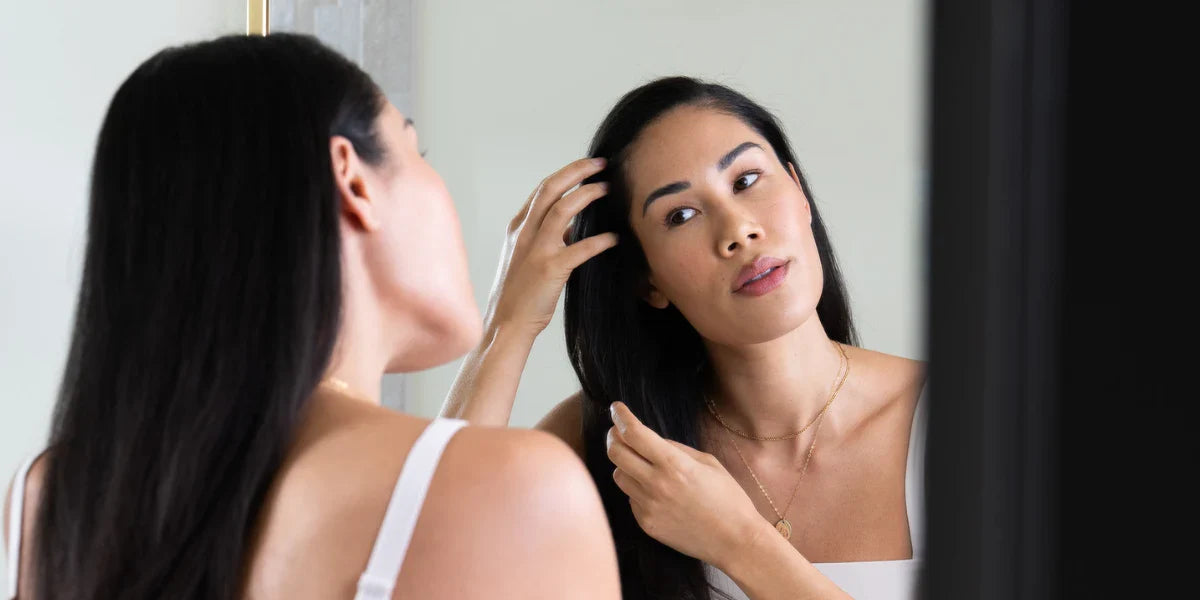This Valentine’s Day, we want to shed light on an issue that can be difficult to talk about— how to help our loved ones who may be suffering from hair loss. For many people, hair loss is a sensitive issue and the stakes are even higher when it’s someone we know and deeply care about who’s going through it. Is there a right (or wrong) way to approach this topic? Here’s our guide featuring what we think are the three essential elements to navigating this conversation in an empathetic and beneficial way.
If your boyfriend, girlfriend or significant other is experiencing hair loss, it’s normal to want to talk about it. In fact, in some cases, hair loss can indicate a more serious underlying health problem, so it’s not something that should be automatically brushed off or ignored. However, you may want to consider letting them approach you when they’re ready and allowing them to lead the conversation.
Our first tip is to focus on listening, instead of telling your partner what they should or shouldn’t do about their hair loss. It can take an incredible amount of courage for someone to be vulnerable about the impact that hair loss is having on their confidence or self-esteem. They could also be battling with anxiety over their hair loss worsening. Offer a safe and supportive ear while you gather information about what they’re going through.
The second tip is to understand that hair loss is more than skin-deep. We’ve already touched on how hair loss can cause or worsen anxiety in some people. For others, the mental health impacts manifest themselves in the form of depression. While it might seem like “just hair”, hair loss can trigger feelings of being out-of-control because it’s a biological process that seems to begin and progress without any conscious effort. And given how closely tied to identity one’s hair is, it’s important not to underestimate these impacts.
3) RESEARCH
As a next step after understanding what might be contributing to your partner’s hair loss, you can also consider supporting them by researching potential treatments. Treating hair loss is not a one-size-fits-all situation, so be sure to consider all your options. These can include pharmaceutical therapies like finasteride, minoxidil, dutasteride, spironolactone for hair loss, or alternative interventions like applying rosemary oil and derma-rolling. Although the treatment decision is ultimately theirs to make, researching and being aware of the options is one way to lighten their burden and show that you care. If your partner would like an expert opinion, they’re always welcome to start a consultation with a specialist physician through the XYON platform.
Hair loss, depression and anxiety: What's the Link?
A study conducted in 2019 found that individuals suffering from androgenetic hair loss scored significantly higher for symptoms of anxiety and depression compared to participants who didn’t have hair loss (Gupta et al., 2019).
What’s more, the area that was most negatively affected by hair loss was their personal relationships. In 2021, a similar study was conducted on a female-only cohort which found that even after 6 months of using a balding treatment and self-reported satisfaction with results, more than half of the women still felt that hair loss was having negative impact on their social lives (Zac et al., 2021).
Does anxiety cause hair loss?
One of the most nefarious things about hair loss is that the psychosocial impacts can feed into a self-perpetuating cycle. It’s been well-established in animal studies that prolonged periods of stress can be detrimental to hair growth.
What’s happening is that the constant stimulation of the nervous system leads to endocrine, or hormonal imbalances that trigger inflammation in the hair follicles. Over time, this can negatively impact hair quality by forcing hair follicles to stop growing prematurely or damage hair cells and surrounding tissues.
In recent years, scientists have discovered that a similar process occurs in humans, where stress activates certain relationships between the brain and immune system that terminate hair growth (Peters et al., 2017). So, anxiety about hair loss can in fact, cause hair loss or worsen it.
Depression and hair loss
The impact of hair loss on one’s risk for developing a psychological comorbidity has also been explored in terms of depression. One 2019 study found that patients with alopecia areata, a type of autoimmune hair loss, had a 34% greater chance of experiencing major depressive disorder. Additionally, having a depressive disorder appeared to increase the risk of developing alopecia areata by 90% (Vallerand et al., 2019). These results tell us that the treatment of hair loss should be holistic and involve carefful examination and management of any psychological effects for the best outcomes. Remember: hair loss is more than skin deep.
Supporting your partner with hair loss: Takeaway
Talking to your significant other about a change in their appearance can be difficult. But there are ways to have these conversations that are supportive and respectful. Remember, hair loss is not just a superficial issue and it could be happening alongside mental health struggles that aren’t immediately obvious, like worsening anxiety or depression. Showing empathy and care could make a world of difference to their quality of life and your connection in the long term.




